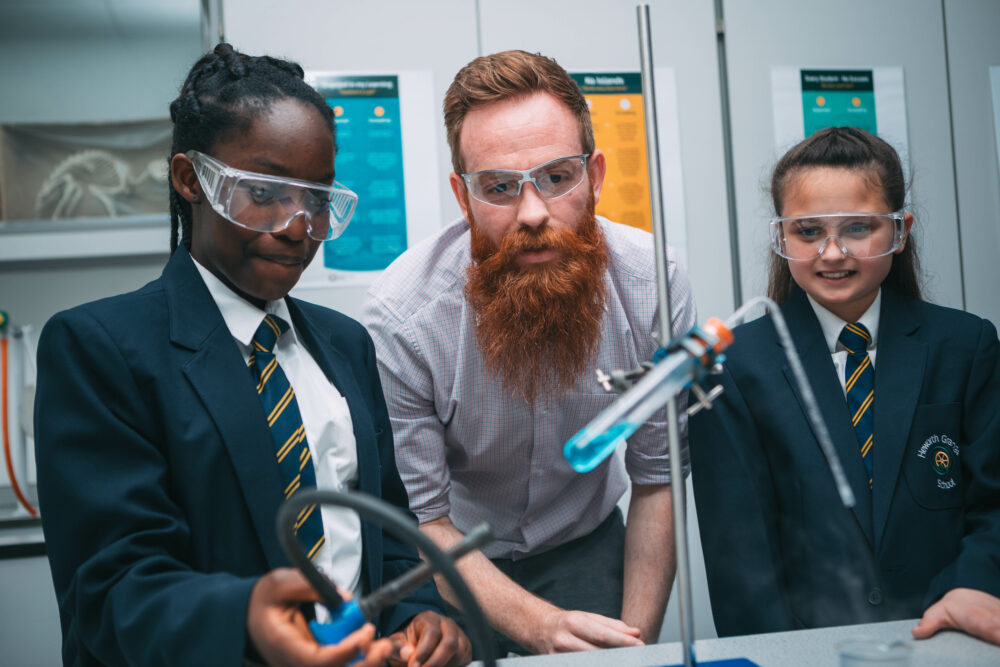Some primary pupils go months without science classes and few schools have a plan to develop their teachers’ knowledge in the subject, Ofsted said.
The watchdog has published a report looking at the strength and weaknesses of how science is taught in schools.
It marks the first in a new series of subject reports from the watchdog, which will draw on evidence gathered during routine inspections.
The latest document draws on Ofsted’s 2021 science research review, and finds that science curriculums are improving despite ongoing challenges caused by Covid.
But it says improvements still required, including the amount of opportunities for practical work offered within secondary schools.
Chief inspector, Amanda Spielman, said she was “encouraged” by progress made in the subject.
“I hope that this review helps subject leaders and teachers to construct a challenging science curriculum with relevant and useful practical work,” she added.
So what did Ofsted find?
1. Most pupils studying ‘ambitious’ science curriculum …
According to the report, most pupils, including those with special educational needs or disabilities (SEND), were studying a science curriculum “at least as ambitious” as the national curriculum.
It added that such curriculums were mainly focused on developing pupils’ knowledge of “substantive concepts” such as habitats or materials.
2. … but few develop teachers’ science knowledge
Inspectors found teachers rarely drew on evidence-based, subject-specific approaches when teaching.
“Very few” schools were found to have a clear plan of how to develop teachers’ knowledge of science and how to teach it through continuing professional development (CPD).
3. Secondaries ‘wrongly assume pupils learn little at primary’ …
Inspectors found some leaders planned the science curriculum to build on what pupils learned in the previous phase of education.
But the watchdog added that in some secondary schools, “it was incorrectly assumed that pupils learned little science in primary school”.
This led to some content being “unnecessarily” repeated in year 7 and beyond.
4. … But some primary pupils do go months without science classes
The report found science was taught weekly in most primaries, but in a few schools pupils had less than one science lesson every week.
It added that “occasionally” pupils went for entire half terms without learning science.
It highlighted this a “concern because science is a core subject of the national curriculum”.
5. Differences in the amount of practical work taking place
In the “significant minority” of schools where pupils weren’t developing secure knowledge of science, the focus was “too often” on identifying practical activities for pupils to complete.
But Ofsted noted that pupils in primary were much more likely to take part in hands-on practical activities than those in secondary.
And what does Ofsted recommend to improve science in schools?
- Schools should plan to secondary curriculum to build on what pupils learned at primary, rather than repeat it.
- Ensure enough time is built into the curriculum for pupils to both learn and remember knowledge.
- Pupils should have enough opportunities to take part in high-quality practical work that has a clear purpose in relation to the curriculum.
- During explanations, teachers should regularly connect new learning to what pupils have already learned.
- Schools should create a continuous approach to developing the science expertise of staff and leaders that “aligns” with the school’s curriculum.
- Ensure the science curriculum is planned to take account of what pupils learn, particularly in mathematics.
















So the Ofsted inspectors are slating departments for not teaching high enough level science to y7 whilst also saying many primary schools fail to teach science to a basic level.
Can they not see the disconnect here. Secondaries have to teach students from many feeder primaries so cannot assume any prior knowledge because of the terrible state of science at primary. The lack of knowledge from primary is not news to secondary and then they seem to be penalised for teaching to where the students actually are!
Gosh the sane thoughts were going through my mind as I read the article. Do ofsted expect secondary schools to contact every feeder primary school to determine what was covered on their science curriculum and plan accordingly? How can they not see how contradictory their suggestions for improvement are?!